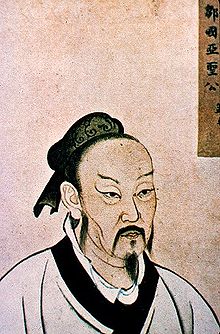Ethics
Main article: Mohist consequentialism
What is the purpose of houses? It is to protect us from the wind and cold of winter, the heat and rain of summer, and to keep out robbers and thieves. Once these ends have been secured, that is all. Whatever does not contribute to these ends should be eliminated.[5]
—Mozi, Mozi (5th century BC) Ch 20
Confucian philosopher Mencius was one of several critics of Mozi, in part because his philosophy lacked filial piety
Unlike utilitarianism, which views pleasure as a moral good, "the basic goods in Mohist consequentialist thinking are... order, material wealth, and increase in population".[8] During Mozi's era, war and famines were common, and population growth was seen as a moral necessity for a harmonious society. The "material wealth" of Mohist consequentialism refers to basic needs like shelter and clothing, and the "order" of Mohist consequentialism refers to Mozi's stance against warfare and violence, which he viewed as pointless and a threat to social stability.[5]
end partial quote from:
https://en.wikipedia.org/wiki/Mozi

No comments:
Post a Comment